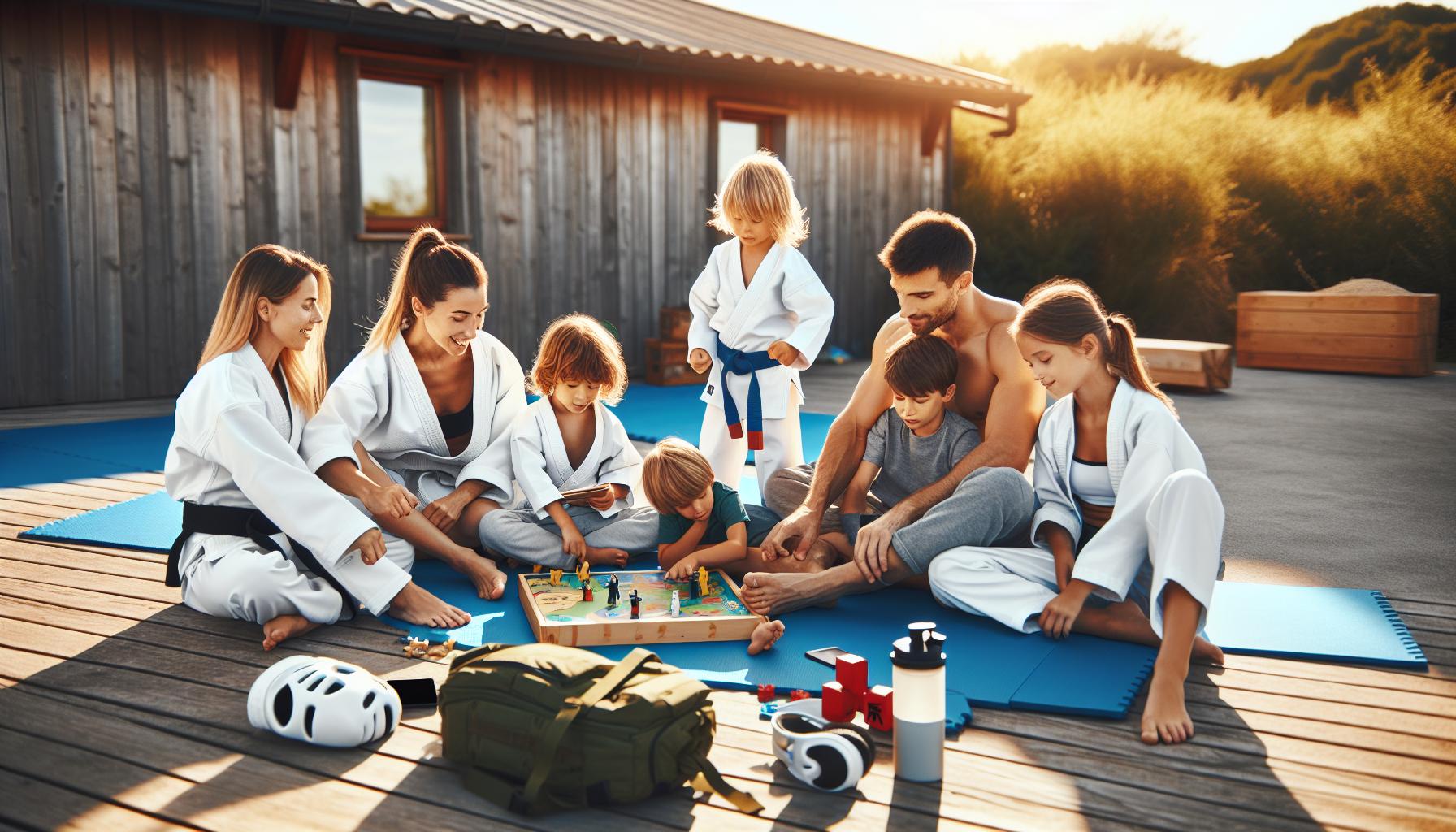Is Jiu Jitsu Good for Kids with ADHD? Benefits Explained
In a world where kids are often bouncing off the walls faster than a rubber ball in a pinball machine, finding an effective outlet for that energy can seem like searching for a needle in a haystack—blindfolded. Enter Jiu Jitsu, the martial art that’s as much about mental focus as it is indeed about grappling in pajamas. But wait,can this ancient art truly benefit kids with ADHD? Spoiler alert: the answer is a resounding yes! In this article,we’ll dive into how Jiu Jitsu offers physical discipline,boosts concentration,and helps kids unleash their inner ninja—all while having a blast! So,grab your gi and let’s roll into the world of dynamic moves,life lessons,and the incredible advantages of Jiu Jitsu for your little ball of energy!
Understanding ADHD and Its Impact on Children
Attention Deficit Hyperactivity Disorder (ADHD) is a neurodevelopmental disorder that affects millions of children worldwide.It manifests through symptoms such as inattention, hyperactivity, and impulsivity, which can substantially impact a child’s daily life, academic performance, and social interactions. Research suggests that these symptoms frequently enough stem from differences in brain structure and chemistry, leading to challenges in focus and self-regulation.
The impact of ADHD on children can be profound:
- Academic challenges: Children with ADHD may struggle to sit still,follow instructions,and complete tasks,resulting in lower academic performance.
- Social difficulties: Impulsivity can lead to difficulties in making and maintaining friendships, as children may interrupt others or struggle with turn-taking.
- Emotional Regulation: Many children with ADHD experience heightened emotions and can become easily frustrated, which affects their overall well-being.
As parents and educators seek effective interventions, activities like Jiu Jitsu emerge as potential solutions. This martial art offers structured environments that help children with ADHD develop important skills such as discipline, focus, and self-control. The physical activity involved can also aid in channeling energy positively, which is crucial for children who often feel restless and distracted.
Moreover, engaging in Jiu Jitsu can foster social skills through team interactions and shared experiences.The practice not only emphasizes respect and cooperation but also rewards persistence and achievement, allowing children with ADHD to build self-esteem over time.
| Benefits of Jiu Jitsu for Kids with ADHD | description |
|---|---|
| improved Focus | Training sessions require concentration, helping kids with ADHD practice sustained attention. |
| Enhanced Discipline | learning techniques necessitates following rules and instructions, instilling a sense of discipline. |
| Physical Outlet | Jiu Jitsu provides a productive way to expend excess energy, reducing restlessness. |
| Boosted Confidence | Mastering new skills can greatly enhance a child’s self-esteem and sense of accomplishment. |
The Role of Physical Activity in Managing ADHD Symptoms
Physical activity plays a crucial role in helping children with ADHD manage their symptoms more effectively. Engaging in regular exercise can lead to improved concentration and a reduction in impulsivity.This is especially critically important for kids with ADHD, as these symptoms can significantly hinder their ability to succeed academically and socially.
Jiu Jitsu, a martial art that emphasizes discipline, focus, and physical fitness, offers unique benefits tailored to address the challenges faced by children with ADHD. some of the key advantages include:
- Structured Environment: The format of Jiu Jitsu classes provides a structured routine, helping children feel more secure and focused.
- Enhancing Self-Control: The practice encourages self-discipline, which can assist children in managing impulsivity associated with ADHD.
- Boosting Social Skills: Interaction with peers during training fosters teamwork and communication, helping kids build essential social skills.
- Physical Release: Martial arts allow for physical expression,helping to release pent-up energy and frustration in a constructive manner.
Along with these benefits, a recent study highlighted that children engaging in martial arts demonstrated improved attention spans compared to those who did not participate in physical activities. This underscores the importance of integrating such activities into their lifestyle. Hear’s a simple overview of how Jiu Jitsu can positively impact kids with ADHD:
| Benefit | Impact on ADHD Symptoms |
|---|---|
| Improved Focus | Higher attention span during tasks |
| Increased Discipline | Better impulse control |
| Enhanced Confidence | Lower anxiety in social situations |
| Physical fitness | Better overall health and mood regulation |
Incorporating Jiu Jitsu into the routine of a child with ADHD not only provides physical benefits but also fosters mental and emotional growth. The combination of physical activity, structured training, and social interaction creates a holistic approach to managing ADHD symptoms, making it an excellent choice for families seeking positive outlets for their children.
Exploring the Benefits of Jiu Jitsu for kids with ADHD
Martial arts, particularly jiu Jitsu, can serve as a transformative outlet for children with ADHD. This physical discipline not only offers a space for physical activity but also cultivates crucial skills that can aid in managing ADHD symptoms. Here are some key benefits:
- Enhanced Focus: Jiu jitsu requires students to pay attention to instructions and techniques, fostering improved concentration. The structured environment provides frequent opportunities for children to practice focus in a controlled setting.
- Physical Outlet: The high-energy movements in Jiu Jitsu provide a healthy way for kids to release pent-up energy. This physical exertion is essential for children with ADHD, as it can lead to reduced hyperactivity and improved mood.
- Social Skills Development: Classes frequently enough involve pair training, allowing kids to interact with peers in a supportive environment. This teamwork helps build communication skills and promotes friendships, essential for emotional development.
- Self-Discipline: Learning techniques and progressing in belt ranks nurtures a sense of achievement and discipline, which can be highly beneficial for children in learning to manage their behaviors and impulses.
Furthermore, the principles of Jiu Jitsu align well with strategies used in ADHD management:
| Jiu Jitsu Principles | ADHD Management Strategies |
|---|---|
| Consistent Practice | Routine and Structure |
| Mindfulness in Techniques | Meditation and Breathing Exercises |
| Positive Reinforcement through Belts | Reward Systems at Home |
| Problem-Solving in sparring | Cognitive Behavioral Techniques |
Incorporating Jiu Jitsu into a child’s routine may lead to a more balanced lifestyle, supporting both their physical health and emotional well-being. This martial art can empower children with ADHD to harness their energy positively, improve their social interactions, and build self-confidence.
Building focus and Discipline through Jiu Jitsu Training
Engaging in Jiu Jitsu training provides children with ADHD a structured environment that fosters focus and discipline. The nature of martial arts requires practitioners to be attentive and present, which can significantly benefit young minds that may struggle with concentration. In each class,students learn various techniques that demand their attention,reinforcing the necessity to follow instructions and remain engaged throughout the session.
One of the key components of Jiu Jitsu is the emphasis on goal-setting. Children are taught to set achievable objectives in their training, whether mastering a specific movement or successfully rolling with a partner. This process encourages them to break down larger challenges into smaller, manageable tasks. The consistent practice of achieving these goals enhances their ability to focus on immediate tasks and promotes a sense of accomplishment.
Moreover, the discipline instilled through Jiu Jitsu is multi-faceted. It not only encompasses physical training but also builds mental resilience. As children progress in their training, they learn to handle failure gracefully, accepting that setbacks are part of the learning process. This mindset shift is crucial for children with ADHD, as it cultivates perseverance and resilience in the face of challenges.
Here’s a summarized look at how Jiu Jitsu can enhance focus and discipline in children with ADHD:
| Benefit | Description |
|---|---|
| Improved Concentration | Engaging exercises requiring attention help sharpen focus. |
| Goal Setting | Encourages breaking down tasks into achievable milestones. |
| Building Resilience | Teaches how to cope with setbacks and continue persevering. |
| Structured Environment | Provides a predictable framework that children can thrive in. |
Social Skills Development and Team Dynamics in Martial Arts
Martial arts, particularly Jiu Jitsu, provides a unique environment that fosters social skills development and enhances team dynamics, which can be particularly beneficial for children with ADHD. In this setting, kids learn to interact and engage with peers in constructive ways, promoting essential social skills such as communication, cooperation, and conflict resolution.
Through structured classes and group activities, children with ADHD can experience:
- Increased Teamwork: Partner drills and group challenges encourage collaboration and help children understand the importance of working with others to achieve a common goal.
- Effective Communication: Jiu Jitsu training emphasizes clear, respectful communication. As they learn techniques, kids learn to express themselves clearly, both verbally and non-verbally.
- Emotional Regulation: Engaging in a team environment helps children to practice managing their emotions, particularly during competitive scenarios or when facing challenges.
- Building Trust: Partnering with peers fosters a sense of trust and safety, necessary for developing deeper relationships.
Furthermore, the supportive atmosphere of a martial arts dojo can act as a protective buffer against feelings of isolation.Children with ADHD may frequently enough feel out of place in traditional social settings, but in martial arts, they find a community of like-minded individuals who share similar experiences. The dojo acts not only as a training ground but also as a social hub where friendships can flourish.
| Benefit | Description |
|---|---|
| Enhanced Focus | Structured routines improve attention span. |
| Problem Solving Skills | Real-time strategy application during sparring. |
| self-Esteem | Mastering new techniques builds confidence. |
| Respect for Others | Core martial arts principle emphasizes respect and discipline. |
the blend of physical activity, social interaction, and structured discipline found in Jiu Jitsu can work wonders for children with ADHD, equipping them with vital social tools while navigating a team-oriented environment.
Creating a Supportive Environment in Jiu Jitsu classes
Creating a nurturing atmosphere in Jiu Jitsu classes is essential, especially for children with ADHD. This environment can significantly impact their ability to engage and learn effectively. Here are some key aspects that contribute to such an atmosphere:
- Positive Reinforcement: Instructors should focus on praising effort rather than merely outcomes. This boosts confidence and encourages children to participate more actively.
- Structured Classes: A well-structured routine helps children with ADHD to understand expectations. Clear instructions and a consistent flow of activities can make a big difference in their ability to focus.
- Inclusive Engagement: Instructors should ensure that all children, nonetheless of their skill level, feel included in drills and techniques. Pairing kids strategically can foster camaraderie and reduce feelings of isolation.
- Mindfulness Practices: Incorporating mindfulness or breathing exercises at the beginning or end of class can help sharpen focus and provide calming mechanisms for children who might feel overwhelmed.
Furthermore, a supportive environment extends to parents and guardians as well. Building a strong community within the dojo encourages families to connect and share experiences.Regular communication between instructors and parents can also help tailor training to meet specific needs. Here’s a simple framework to enhance collaboration:
| Communication Methods | Purpose |
|---|---|
| Regular Updates via Newsletter | Keep parents informed about class activities and progress. |
| Parent-Teacher Meetings | Discuss individual students’ growth and strategies. |
| Social Events | Foster community spirit and encourage family involvement. |
Ultimately, establishing a supportive environment in Jiu Jitsu classes plays a pivotal role in accommodating the unique learning styles of children with ADHD, allowing them to thrive not only on the mat but also in their everyday lives.
Practical Tips for Parents: Finding the Right Jiu Jitsu Program
Choosing the right Jiu Jitsu program for your child can significantly impact their experience and development. It’s essential to consider several factors that align with their needs, especially if they have ADHD.Here are some practical tips:
- Look for a Supportive Environment: Ensure the program is welcoming and inclusive. Classes that foster positive reinforcement and focus on personal growth can be particularly beneficial.
- Instructor Qualifications: find coaches who are experienced in working with children and who understand the unique needs of kids with ADHD. Their approach can make all the difference in your child’s progress.
- Class Size: Smaller class sizes can provide more individualized attention, helping your child stay engaged and focused.
- Trial Classes: Many programs offer trial classes. Take advantage of these to assess the coaching style and the overall atmosphere of the gym.
Additionally, the program’s structure is crucial. here’s a brief overview of what to look for in class format:
| Class Feature | Importance |
|---|---|
| Clear lesson plans | Helps kids stay focused and understand expectations |
| Consistent routine | Provides stability which can aid attention and engagement |
| Variety in techniques | Maintains interest and encourages exploration |
| Progress tracking | Encourages motivation through tangible achievements |
by considering these elements, you can select a Jiu Jitsu program that not only enhances your child’s skills but also supports their overall well-being and personal development.
Faq
How can Jiu Jitsu help children with ADHD?
Jiu Jitsu offers several benefits specifically for children with ADHD that can enhance their focus, discipline, and physical coordination. One of the primary advantages is the structured environment of Jiu Jitsu classes. These classes typically follow a consistent schedule that includes warm-ups, technique instruction, drilling, and rolling, which can be particularly beneficial for children who may struggle with unpredictability or transitions. The routine allows kids with ADHD to establish expectations and improves their ability to concentrate.
Additionally, the physical activity involved in Jiu Jitsu serves as an excellent outlet for energy.Regular bouts of physical exercise can lead to boosted endorphin levels, which are known to improve mood and decrease anxiety.A study published in the Journal of Attention Disorders found that children with ADHD who engaged in aerobic exercise reported improvements in attention and behaviour. In Jiu Jitsu, the combination of cardio and strength training during techniques can thus be incredibly advantageous, keeping the children engaged and active while helping to reduce symptoms associated with ADHD.
What are the social benefits of practicing Jiu Jitsu for kids with ADHD?
Social interaction can sometimes be a challenge for children with ADHD; though, Jiu Jitsu provides a unique platform for developing social skills.The activity typically involves working with a partner during drills or sparring, which promotes communication, teamwork, and respect for others. These interactions in a supportive setting can help children learn to navigate social cues and improve their ability to engage with peers.moreover, the camaraderie developed within a Jiu Jitsu dojo can foster a sense of belonging and improve self-esteem. kids often find themselves making friends who are also interested in martial arts, creating a network of support outside of the typical school environment. Hearing words of encouragement and experiencing collective goals, such as earning new belt ranks, reinforces the importance of teamwork and builds confidence. As children feel more accepted and valued, they may also show improvements in their overall emotional regulation.
Can Jiu Jitsu improve focus and attention in children with ADHD?
yes, jiu Jitsu can significantly enhance focus and attention spans in children with ADHD. The sport requires a high level of concentration to master the intricate techniques and strategies involved, thereby giving children an prospect to practice sustained attention in a fun and engaging way. During drills, kids must pay close attention to their instructors’ demonstrations and remember techniques, which encourages mental discipline.
Moreover, the physical demands of Jiu Jitsu can lead to enhanced cognitive function. According to research,exercise increases blood flow to the brain and stimulates the production of brain-derived neurotrophic factor (BDNF),which supports neuron health and function. By regularly participating in Jiu Jitsu, children can not only foster physical fitness but also stimulate their brains, thus improving their ability to focus and concentrate both in and outside the dojo.
Are there any studies supporting the benefits of martial arts for children with ADHD?
Yes, multiple studies support the notion that martial arts, including Jiu Jitsu, can be beneficial for children with ADHD. A noteworthy study published in the Journal of Sport and Exercise Psychology found that children practicing martial arts showed greater improvements in attention control compared to those not engaged in similar activities. The disciplined nature of martial arts training encourages a structured approach to both physical and mental challenges, which is particularly beneficial for children facing ADHD.
Moreover, another study presented in Pediatrics revealed that physical activity, including forms of martial arts like Jiu Jitsu, significantly reduced behavioral issues linked to ADHD symptoms. Children enrolled in martial arts programs exhibited greater impulse control and enhanced social behavior. These findings underscore the positive engagement martial arts can facilitate, offering a constructive outlet for both energy and frustration.
What should parents consider when enrolling their child with ADHD in Jiu Jitsu classes?
When enrolling a child with ADHD in Jiu Jitsu classes, parents should consider several key factors to ensure a positive experience. Firstly, it is indeed critically important to assess whether the dojo offers a nurturing environment.A supportive instructor who understands behavioral characteristics related to ADHD and is willing to work with children on an individual basis can make a critically important difference in the overall experience. Look for programs that emphasize patience, encouragement, and personal development.
Additionally, consider your child’s interests and comfort level with physical contact and close-quarters situations. Every child is different; some may thrive in the Jiu Jitsu environment, while others may require option forms of physical activity. Starting with trial classes can definitely help gauge their interest. communication is essential. Regularly check in with your child about their experiences and feelings regarding the classes to ensure they are feeling fulfilled and engaged, fostering a positive attitude toward participation.
How does the structure of Jiu Jitsu training aid in self-regulation for children with ADHD?
Jiu Jitsu training’s structured format plays a pivotal role in fostering self-regulation skills for children with ADHD. The progression from warm-up exercises to intricate techniques and sparring creates a predictable sequence that helps children learn to manage their time and expectations. This level of organization is beneficial as children with ADHD often struggle with impulsivity and maintaining focus. Knowing what to expect helps them settle into the routine, thereby enhancing their ability to self-regulate their behavior.
Additionally, the practice of Jiu Jitsu involves waiting for turns and observing others during sparring sessions. This aspect of training teaches patience and self-control, reinforcing the importance of observing before acting. As children learn to regulate their own responses in a competitive yet safe environment, they develop valuable life skills that can be applied outside martial arts, perhaps leading to improved behavior and social interactions in everyday life.
Insights and Conclusions
the intersection of Jiu Jitsu and ADHD presents a promising avenue for enhancing children’s developmental outcomes. As we’ve explored, this martial art offers not only physical benefits but also invaluable skills such as focus, discipline, and emotional regulation.Research indicates that structured activities like Jiu Jitsu can significantly improve attention span and reduce hyperactivity, making it a compelling option for children with ADHD.
Moreover, the supportive community often found in martial arts gyms provides a safe environment where kids can build self-esteem and social skills, key areas that can sometimes be challenging for those with ADHD.With consistent practice, children not only learn techniques but also life lessons that can carry over into their daily lives.
Ultimately, the positive impact of Jiu Jitsu on children with ADHD underscores the importance of tailored physical activities that cater to their unique needs. If you’re considering a new approach to help your child thrive, Jiu Jitsu might just be the perfect fit. By fostering their physical and mental well-being, you set the stage for a brighter, more confident future. Engaging in this journey not only empowers them but also enriches your family’s experience in exploring the myriad benefits of martial arts.





